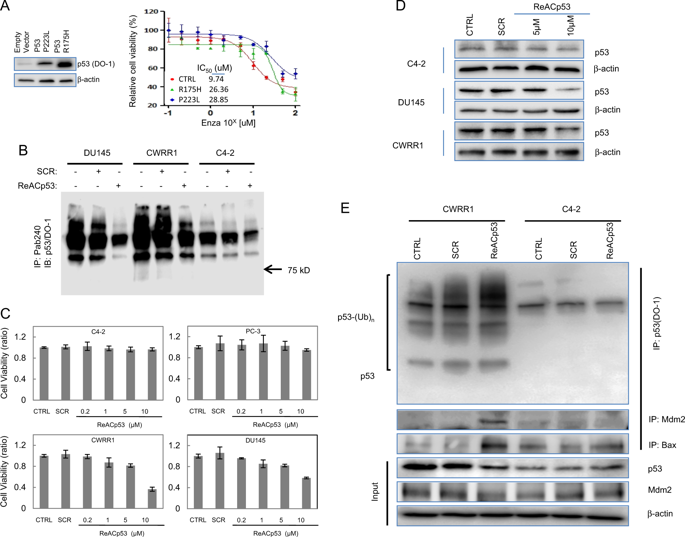当前位置:
X-MOL 学术
›
Prostate Cancer Prostatic. Dis.
›
论文详情
Our official English website, www.x-mol.net, welcomes your
feedback! (Note: you will need to create a separate account there.)
Therapeutic potential of ReACp53 targeting mutant p53 protein in CRPC.
Prostate Cancer and Prostatic Diseases ( IF 5.1 ) Pub Date : 2019-08-30 , DOI: 10.1038/s41391-019-0172-z Yaqun Zhang 1 , Lingfan Xu 2, 3 , Yan Chang 2, 4 , YanJing Li 2 , William Butler 2 , Er Jin 2, 5 , Aifen Wang 2 , Yulei Tao 2 , Xufeng Chen 2 , Chaozhao Liang 3 , Jiaoti Huang 2
Prostate Cancer and Prostatic Diseases ( IF 5.1 ) Pub Date : 2019-08-30 , DOI: 10.1038/s41391-019-0172-z Yaqun Zhang 1 , Lingfan Xu 2, 3 , Yan Chang 2, 4 , YanJing Li 2 , William Butler 2 , Er Jin 2, 5 , Aifen Wang 2 , Yulei Tao 2 , Xufeng Chen 2 , Chaozhao Liang 3 , Jiaoti Huang 2
Affiliation

|
BACKGROUNDS
p53 is a tumor suppressor that prevents cancer onset and progression, and mutations in the p53 gene cause loss of the tumor suppressor function of the protein. The mutant p53 protein in tumor cells can form aggregates which contribute to the dominant-negative effect over the wild-type p53 protein, causing loss of p53 tumor suppression or gain of novel oncogenic functions. Mutations in p53 have been implicated in the pathogenesis of primary prostate cancer (PCa), and are often detected in recurrent and metastatic disease. Thus, targeting mutant p53 may constitute an alternative therapeutic strategy for advanced PCa for which there are no other viable options.
METHODS
In this study, we used immunoprecipitation, immunofluorescence, clonogenic survival, and cell proliferation assays, flow cytometric analysis and in vivo xenograft to investigate the biological effects of ReACp53, a cell-permeable peptide inhibitor of p53 aggregation, on mutant p53-carrying PCa cells.
RESULTS
Our results show that ReACp53 targets amyloid aggregates of mutant p53 protein and restores the p53 nuclear function as transcriptional factor, induces mitochondrial cell death and reduces DNA synthesis of mutant p53-carrying PCa cells; ReACp53 also inhibits xenograft tumor growth in vivo.
CONCLUSIONS
The data presented here suggest a therapeutic potential of targeting mutant p53 protein in advanced PCa setting, which has a clinical impact for aggressive PCa with transforming how such tumors are managed.
中文翻译:

ReACp53 靶向 CRPC 突变体 p53 蛋白的治疗潜力。
背景 p53 是一种肿瘤抑制因子,可防止癌症的发生和发展,p53 基因的突变会导致该蛋白质的肿瘤抑制功能丧失。肿瘤细胞中的突变 p53 蛋白可以形成聚集体,这有助于对野生型 p53 蛋白产生显性负效应,从而导致 p53 肿瘤抑制丧失或获得新的致癌功能。p53 突变与原发性前列腺癌 (PCa) 的发病机制有关,并且经常在复发和转移性疾病中检测到。因此,靶向突变体 p53 可能构成晚期 PCa 的替代治疗策略,没有其他可行的选择。方法 在这项研究中,我们使用了免疫沉淀、免疫荧光、克隆形成存活和细胞增殖测定,流式细胞术分析和体内异种移植以研究 ReACp53(一种 p53 聚集的细胞渗透性肽抑制剂)对携带突变型 p53 的 PCa 细胞的生物学效应。结果 我们的结果表明,ReACp53 靶向突变体 p53 蛋白的淀粉样蛋白聚集体并恢复 p53 核功能作为转录因子,诱导线粒体细胞死亡并减少携带突变体 p53 的 PCa 细胞的 DNA 合成;ReACp53 还在体内抑制异种移植肿瘤的生长。结论 这里提供的数据表明在晚期 PCa 环境中靶向突变 p53 蛋白的治疗潜力,这对侵袭性 PCa 具有临床影响,并改变了此类肿瘤的管理方式。结果 我们的结果表明,ReACp53 靶向突变体 p53 蛋白的淀粉样蛋白聚集体并恢复 p53 核功能作为转录因子,诱导线粒体细胞死亡并减少携带突变体 p53 的 PCa 细胞的 DNA 合成;ReACp53 还在体内抑制异种移植肿瘤的生长。结论 这里提供的数据表明在晚期 PCa 环境中靶向突变 p53 蛋白的治疗潜力,这对侵袭性 PCa 具有临床影响,并改变了此类肿瘤的管理方式。结果 我们的结果表明,ReACp53 靶向突变体 p53 蛋白的淀粉样蛋白聚集体并恢复 p53 核功能作为转录因子,诱导线粒体细胞死亡并减少携带突变体 p53 的 PCa 细胞的 DNA 合成;ReACp53 还在体内抑制异种移植肿瘤的生长。结论 这里提供的数据表明在晚期 PCa 环境中靶向突变 p53 蛋白的治疗潜力,这对侵袭性 PCa 具有临床影响,并改变了此类肿瘤的管理方式。
更新日期:2019-08-30
中文翻译:

ReACp53 靶向 CRPC 突变体 p53 蛋白的治疗潜力。
背景 p53 是一种肿瘤抑制因子,可防止癌症的发生和发展,p53 基因的突变会导致该蛋白质的肿瘤抑制功能丧失。肿瘤细胞中的突变 p53 蛋白可以形成聚集体,这有助于对野生型 p53 蛋白产生显性负效应,从而导致 p53 肿瘤抑制丧失或获得新的致癌功能。p53 突变与原发性前列腺癌 (PCa) 的发病机制有关,并且经常在复发和转移性疾病中检测到。因此,靶向突变体 p53 可能构成晚期 PCa 的替代治疗策略,没有其他可行的选择。方法 在这项研究中,我们使用了免疫沉淀、免疫荧光、克隆形成存活和细胞增殖测定,流式细胞术分析和体内异种移植以研究 ReACp53(一种 p53 聚集的细胞渗透性肽抑制剂)对携带突变型 p53 的 PCa 细胞的生物学效应。结果 我们的结果表明,ReACp53 靶向突变体 p53 蛋白的淀粉样蛋白聚集体并恢复 p53 核功能作为转录因子,诱导线粒体细胞死亡并减少携带突变体 p53 的 PCa 细胞的 DNA 合成;ReACp53 还在体内抑制异种移植肿瘤的生长。结论 这里提供的数据表明在晚期 PCa 环境中靶向突变 p53 蛋白的治疗潜力,这对侵袭性 PCa 具有临床影响,并改变了此类肿瘤的管理方式。结果 我们的结果表明,ReACp53 靶向突变体 p53 蛋白的淀粉样蛋白聚集体并恢复 p53 核功能作为转录因子,诱导线粒体细胞死亡并减少携带突变体 p53 的 PCa 细胞的 DNA 合成;ReACp53 还在体内抑制异种移植肿瘤的生长。结论 这里提供的数据表明在晚期 PCa 环境中靶向突变 p53 蛋白的治疗潜力,这对侵袭性 PCa 具有临床影响,并改变了此类肿瘤的管理方式。结果 我们的结果表明,ReACp53 靶向突变体 p53 蛋白的淀粉样蛋白聚集体并恢复 p53 核功能作为转录因子,诱导线粒体细胞死亡并减少携带突变体 p53 的 PCa 细胞的 DNA 合成;ReACp53 还在体内抑制异种移植肿瘤的生长。结论 这里提供的数据表明在晚期 PCa 环境中靶向突变 p53 蛋白的治疗潜力,这对侵袭性 PCa 具有临床影响,并改变了此类肿瘤的管理方式。































 京公网安备 11010802027423号
京公网安备 11010802027423号